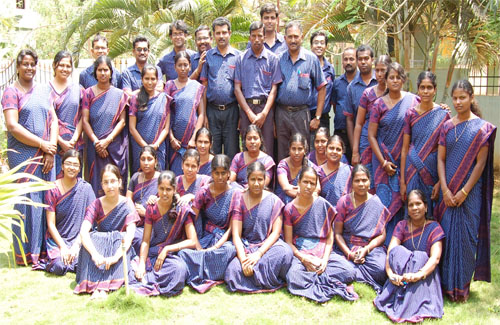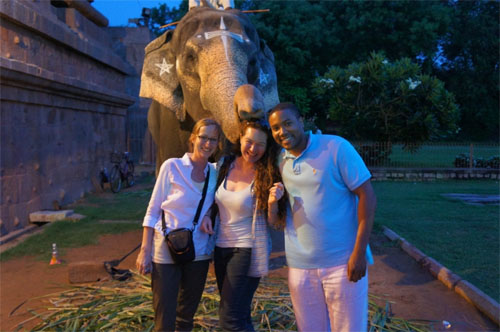by Claire Jarvis, Marie-Sarah Jouffroy, and Christian Wilson*
The Beginning:
When we first decided to work on the ICTPH project we knew little about healthcare in India, little about the scope of the project and little about each other. But despite these deficiencies we were passionate about healthcare and enthusiastic and eager to learn about ICTPH and its mission. After reading through the initial materials and some background research we were eager to speak to ICTPH and to get started on the project. Before setting up our first call we decided to meet to assign team roles and discuss project scope. Whilst the first few calls were plagued with poor call quality, some timing miscommunications and a redefining of the project goals, we soon found our stride and committed to calls at a minimum every two weeks to update ICTPH on our progress.

Defining a Problem and Attacking it with a 3-Pronged Approach:
Over the first week or two we were able to settle on a feasible, manageable and measureable problem to address and internally we developed a clear plan of attack. Desk research focused on three primary target areas: healthcare models internationally, microinsurance in India and microinsurance approaches outside of India with each of us focused on a different topic. We condensed our findings into profiles for reference and started to relay some of research findings of best practices, financing options and potential pitfalls through our biweekly calls. Additionally, we had decided to reach out to a number of contacts for formal interviews. We spoke to individual members of the ICTPH team, an extensive list of healthcare and microfinance contacts set up by ICTPH and some contacts through our network at the business school. The interviews proved to be an invaluable source of information both on providing context about the state of healthcare in the India and understanding the mindset of the rural population. Many of the very accomplished network of people were, not only, familiar with the mission and vision of ICTPH, but also, extremely knowledgeable regarding microinsurance, microfinance or healthcare. In addition to the wealth of information derived from interviews and our own desk research, we decided that a patient survey would be useful. We hoped the survey, to be administered to patients as they came into the clinic, would give us insight into the demographic profile of the patients, the services they were utilizing most frequently, what they valued most in a provider and their willingness-to-pay.
One of main things we came to notice as we continued to speak frequently with the ICTPH team was that they had extremely strong data analytical skills and that they had approached their pricing strategy for the new product offering from a cost perspective. Our research, though, repeatedly stressed the importance of considering pricing from more of a willingness-to-pay perspective. Additionally, through case studies we noticed that key success factors in other attempts had been educating the rural population on the concept of insurance or prepayment and the significant amount of time necessary to launch similar products. As we continued to develop and refine our understanding of ICTPH’s mission, vision and values we began to see how our project might fit into the organization and we began passing on relevant learnings to the ICTPH team to assess their buy-in to the concepts and learn where we needed to do more research. As we continued interviews we also started to look at specific implementation issues surrounding the product design (i.e., what features would be offered in the package) as well as what would be required to bring the product to market. Data from interviews, desk research and the patient survey served as valuable information to help guide our thinking and allow us to create hypotheses that we would then test on our trip to India.

SughaVazhvu Healthcare and ICTPH Teams in Thanjavur, Tamil Nadu, India
Travel to India
Initially, travel to India was not part of the project details but as the semester continued and we struggled to understand the Indian healthcare landscape and how the rural population might react to the proposed pre-paid offering, it became clear that seeing the ICTPH vision in practice would provide us a richer understanding of the population we were trying to help serve. Our trip to India served to test our hypotheses, adjust our thinking regarding the practicality of some of our recommendations and allowed us to present our final recommendations face-to-face with the client. Since we arrived in the morning we were able to meet some of the team the first day and get a sense for how the week would go. Over then next few days we had the opportunity to visit a few of ICTPH’s clinics and meet some of the doctors and health extension workers providing care in these rural villages. We were also afforded the opportunity to visit a public hospital and community health center giving us a sense for other healthcare options in the area and helping us to understand ICTPH’s value proposition to the rural population. Interspersed throughout the week were interviews with different ICPTH team members for us to delve more deeply into their area of expertise. These meetings were extremely valuable as they allowed us to work through our findings and get real-time response. This immediate feedback (sometimes in the form of pushback) helped us refine and redirect our focus to have maximum impact for our final presentation. And (of course) within of the course of the week we ate lots of amazing food!

Pangea Team at the Thanjavur Brihadeshwara Temple
Final Presentation
For our final presentation we were asked to try to make the session interactive using a workshop format rather than a formal presentation. Thus, we drew on the consulting background of Claire and Marie-Sarah along with some additional frameworks learned in business school to come up with (what we thought) was an engaging way to think through some of main issues ICTPH was struggling with in implementing their health insurance option. After a marathon session Wednesday night we put together a presentation that blended our best-practice learnings, possible pit-falls and important issues with two major framework exercises that we would go through with the ICPTH team real-time. This strategy allowed us to reemphasize the Key Success Factors and then allowed the ICTPH group (using those learnings) to work through two very complex issues, product design and marketing, using tested frameworks to guide their thinking. Here we primarily served the role of facilitators letting the ICTPH team go through the process themselves and struggle with making the tough decisions. The session was very interactive, lively and really brought out some differences of opinion within the group that had to be settled. Ultimately, from our perspective, the session was a success as we were able to both impart what we had learned over the semester and provide the ICTPH group with some helpful frameworks and other tools that will continue to be useful as the project develops and evolves over time. We truly enjoyed our time working with such a talented, passionate and fun group. Thank you to the ICPTH team for allowing us to be a part of this project. We look forward to reading about your successes in future.
Marketing Managed Care to Rural Indian Populations – A Pangea Advisors and ICTPH Collaboration
View more presentations from ICTPH
* The authors are MBA Candidates at the Columbia Business School


Leave a Reply
Be the First to Comment!